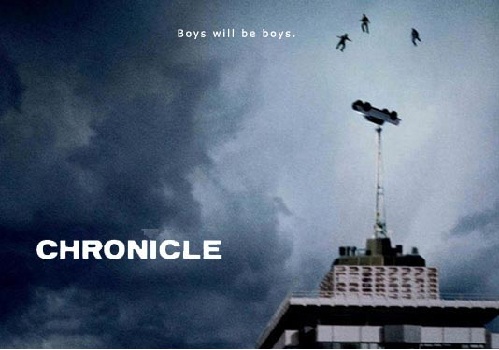
If the last decade in movies has taught us anything on the subject of superpowers, it’s that if you develop them, you will eventually start wearing skin-tight costumes and fighting crime. Not so for the characters in Chronicle. This aptly titled film chronicles what happens when three teenagers develop telekinetic powers, and surprise surprise, they don’t become superheroes. This film might be the most realistic portrayal of how the average kid would use his superpowers that I’ve ever seen.
The teenagers are Andrew, Matt and Steve, all seniors in high school. One night, after a rave party, they discover a hole in the ground in the woods. What they find inside gives them the ability to control objects with their minds. Andrew (played by Dane DeHaan) is the center of the film. He’s the shy one, the social outcast. He gets bullied at school and threatened by drug dealers in his neighborhood. He doesn’t have any friends except for Matt, and even they’re not really friends; they’re cousins. Matt gives Andrew rides to school and invites him out occasionally, but that’s about it.
Matt (played by Alex Russell) is also an outcast, but he’s one by choice. He doesn’t want to be a part of the pettiness and drama of high school, so he chooses to distance himself from it, spending his time reading philosophy instead.
Steve (played by Michael B. Jordan) is the outgoing one. He’s good-looking, easy-going, charismatic, and popular. He’s so popular that we’re introduced to a picture of him—he’s running for class president—before we actually meet him. He couldn’t be more unlike Andrew. Yet when they get their powers, they begin to bond. All three of them do. So much of the fun in this movie is watching them bond as they learn to use their powers.
The powers are pretty cool. They can move and manipulate just about any object with their minds. They start off with smaller objects like tennis balls, but by the end they can move cars and buses. They can protect themselves from injury by creating a sort of force field around their bodies. Eventually they realize they can also manipulate their own bodies, lifting themselves off the ground and even flying. That part was particularly exciting for me. I’ve spent a lot of childhood (and adulthood) hours daydreaming about having superpowers, and flying always excited me more than any other ability. I got to live out my fantasy vicariously in the scenes where the guys are flying above the clouds. I’ve never been more jealous of fictional characters.
The three of them pretty much use their powers the way most kids would: playing pranks on people, eating food hands-free, sitting atop high rise buildings. No one even once suggests that they use their gifts to fight crime. I loved that. It’s all just fun and games for them, that is, until there’s an accident. That’s when they start to realize the true scope of their abilities. They’ve got great power, and now they need to be responsible, and thank goodness they don’t say anything even resembling that line.
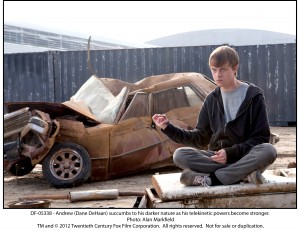 The real heart of the movie is Andrew. Along with being bullied at school, he’s physically abused by his dad, a former firefighter living on disability. His mom is ill and dying. He’s angry, but he’s so weak that he just has to take being pushed around. But then with his powers, he’s not really weak anymore is he? What does someone like that do once he gets power? That’s where the story gets super interesting. I found myself caring about and rooting for Andrew. As a person with social anxiety, I felt a connection to him and was so happy for him when he started making friends. There’s a scene where the three of them are all sleeping over at Steve’s house. Andrew is using his powers to float his video camera above them all. They all agree that the day they just spent together was the best day of their lives. It sounds sappy to call the scene heart-warming, but it was heart-warming and not sappy at all.
The real heart of the movie is Andrew. Along with being bullied at school, he’s physically abused by his dad, a former firefighter living on disability. His mom is ill and dying. He’s angry, but he’s so weak that he just has to take being pushed around. But then with his powers, he’s not really weak anymore is he? What does someone like that do once he gets power? That’s where the story gets super interesting. I found myself caring about and rooting for Andrew. As a person with social anxiety, I felt a connection to him and was so happy for him when he started making friends. There’s a scene where the three of them are all sleeping over at Steve’s house. Andrew is using his powers to float his video camera above them all. They all agree that the day they just spent together was the best day of their lives. It sounds sappy to call the scene heart-warming, but it was heart-warming and not sappy at all.
Oh yeah, the video camera. I haven’t even mentioned that the entire film is seen through the video cameras of characters in the movie. The movie actually begins when Andrew turns his new video camera on. From here on in he will videotape everything. If he explained just why he’s doing it, I don’t remember his reason. No matter though; the movie kicks off, and we’re seeing everything Andrew sees. We meet Matt and Steve through Andrew’s camera. We see him get bullied through his camera. We see his camera get bullied too.
Which is weird. You see, in this movie any video camera or cell phone that takes video is a potential window into the world of this movie. For example, the very first time Andrew talks to a girl in the movie, she also happens to be filming. The movie then changes points of views so that we’re looking out of her camera at Andrew. It’s a bit jarring, but we realize then that the movie isn’t only confined to Andrew’s point of view. What’s so strange about this is that if the movie is just a collection of different videos, who did the collecting? Definitely not Andrew. It doesn’t even seem like he goes back and watches any of the footage he records. We’re used to found footage films by now, but this is something different. I did like it, especially since it’s something I haven’t seen before, but that unanswered question of who put the videos together bothers me a little.
Still, it’s an interesting story, one that’s told more believably than most superhero movies. These kids aren’t heroes. They’re just kids with powers. I felt for them. I wanted to be one of them.
Chronicle
Director: Josh Trank (The Kill Point [TV Series])
Writer: Max Landis
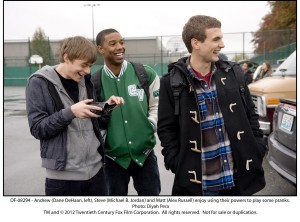
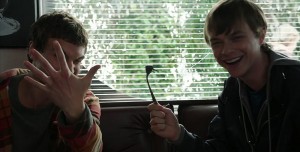
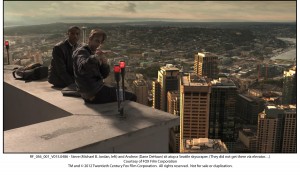
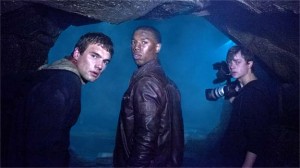

 Posted in
Posted in  Tags:
Tags: 
 The Hobbit: Battle of Five Armies (1/13/15)
The Hobbit: Battle of Five Armies (1/13/15)